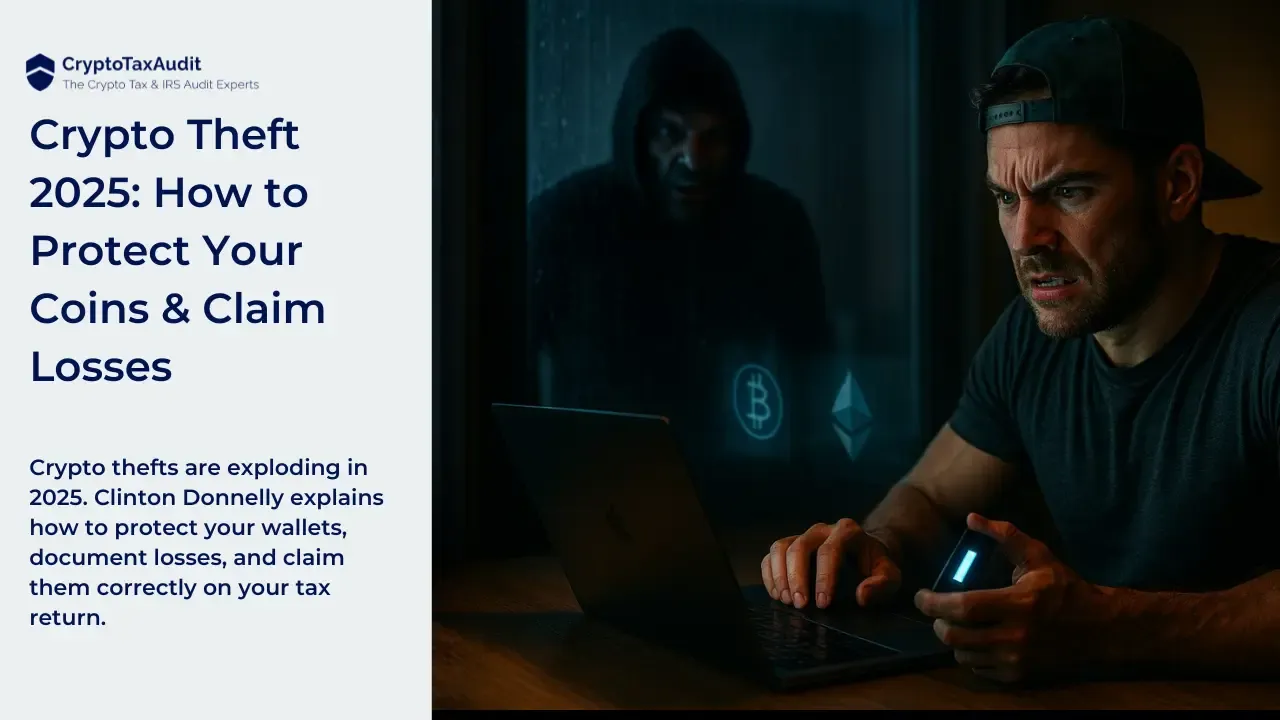
Crypto Theft 2025: How to Protect Your Coins and Claim Tax Losses
By Clinton Donnelly, CEO, Founder | CryptoTaxAudit
2025 has been a huge year for crypto thefts.
We're seeing Ponzi schemes, pig butchering scams, and home invasions where someone puts a gun in your face and makes you unlock your wallet.
The CEO of Ledger publicized his location. Then someone showed up at his house.
I'm tracking a case where thieves took $8 million from a man's home. They forced him into a car.
Three-hour drive to a storage unit where he kept a backup hard drive. He unlocked that wallet too.
They took everything.
It's time to get circumspect about crypto ownership.
Key Takeaways:
- If someone can force you into a car, they can get to your backup. Physical separation must require plane travel to be effective against home invasions
- Crypto theft losses are deductible as investment losses under IRC Section 165(c)(2), not personal losses
- You can only recover your cost basis, not fair market value at the time of theft
- File FBI Cyber Crime reports immediately to document losses for IRS verification
Why Three Hours of Separation Isn't Enough
Picture this: Someone forces you into a car. You're driving. You think your backup plan is safe because it's three hours away.
You're wrong.
That's what happened to the man who lost $8 million.
The thieves cleaned out his home wallet. Then they started asking questions.
Where else do you keep it? He told them because they were holding his wife and child at gunpoint.
They drove him three hours to the storage facility. Made him unlock the second wallet.
Both wallets gone in one night.
A few hours of separation is not adequate. If someone can force you into a car, they can get to your backup.
Your secondary location a plane trip. It's very tough to transport a kidnapped person through airport security.
How to Split Your Crypto Assets Safely
Don't just split seed phrases. Split your actual wallets into separate addresses.
The whole point of a home invasion is simple.
Your Ledger is in your desk drawer. Your PIN is in your head.
They point a gun at you and tell you to unlock it. You unlock it.
Thirty seconds later, your Bitcoin will be transferred to a wallet in another country.
So don't keep your Ledger at home.
You often don't need physical access to it.
If you have the wallet address saved in your Kraken or Coinbase account, you can send coins directly to your Ledger.
The device can sit in a safe deposit box three states away.
Physical Security Steps
- Create multiple cold wallets with different addresses
- Store them in locations very different from each other
- Keep primary storage device off-site, not in your home
- If forced to divulge one wallet, you have others in other locations
Why You Need to Hide Your Address
The biggest weakness is people knowing where you live.
Use a virtual mailbox instead of your home address. Give that out instead.
Think about what happens when Bitcoin hits $1 million.
Your neighbor, who saw you at the crypto conference, now knows two things: you own Bitcoin, and you live at 123 Main Street.
That neighbor loses his job. He gets desperate. He remembers you.
The first rule: be anonymous.
Hide your address. Stop wearing conference t-shirts with "Bitcoin 2025" on them.
Stop posting screenshots of your portfolio on Twitter.
Be careful talking about crypto in public.
Someone asks you about it at a bar? You don't know much about it. You've heard about it, but you never bought any.
Unless you're in a room full of people you completely trust, keep your mouth shut.
Can You Deduct Crypto Theft Losses on Your Tax Return?
Yes. And there's massive confusion about this.
The 2017 Tax Cuts and Jobs Act made it so you could no longer claim personal losses on your tax return.
However, according to Section 165(c)(2) of the tax code, a loss of your investment assets is not considered a personal loss.
It's technically an investment loss.
Section 165 talks about losses. Section C breaks down three types:
- Subparagraph (1): business losses
- Subparagraph (2): investment losses
- Subparagraph (3): personal losses
An investment loss is defined as an activity engaged in for profit.
If you had coins stolen, you can claim that loss on Form 4684. You write it off as a type of itemized deduction where you report casualty and theft losses.
Confused about claiming crypto theft losses? CryptoTaxAudit helps you document losses correctly and respond to IRS inquiries. Learn how we can help.
What You Can Actually Recover
If you get a refund later, the excess has a zero cost basis. You already claimed it as a loss, so you treat the recovery as having zero basis.
With all these losses, you can only recover your basis. That's what you put into the investment.
You cannot recover the fair market value of the investment at the time the loss occurred.
This matters especially with Ponzi losses.
Your statement showed $100,000. You think you're claiming a $100,000 loss. But you only put in $10,000.
The rest was fake returns the scammer made up.
The IRS gives you $10,000. That's your basis. The fake $90,000 in "gains" doesn't count.
They will give you credit for your cost basis. That's it.
What to Do When the IRS Pushes Back
You should always claim your losses.
But if it's a significant loss, expect a letter. The IRS sends Letter 3176C. It says your claim looks frivolous.
You have 30 days to send proof or they'll disallow the deduction.
You need documentation ready before you file.
First thing after a theft: file with the FBI Cyber Crime Unit. File with local police if they'll take the report. Get case numbers. Get copies of everything.
None of this brings your coins back. But when the IRS letter arrives, you need to prove the loss actually happened. No FBI report means no deduction.
Documentation Checklist
- File FBI IC3 complaint immediately after theft
- File local police report if applicable
- Document your original cost basis with records
- Keep all wallet addresses and transaction records
- Save all correspondence about the theft
The police will take your report. They'll write down the wallet address where your Bitcoin went.
Then they'll tell you there's nothing they can do. The wallet's in Moscow or Singapore. Your coins are gone.
But you need that police report number for the IRS. That's the only reason you're filing it.
Track Your Cost Basis Now
This is something to be mindful of in any investment activity you do.
You want to track your cost basis. Be careful how much you set aside.
It's always good to pull stuff out as you make money rather than letting it run.
Frequently Asked Questions About Crypto Taxes
Q: Can I deduct crypto stolen in a home invasion?
A: Yes. Crypto held for investment qualifies as an investment loss under IRC Section 165(c)(2). You report it on Form 4684. CryptoTaxAudit can help you document the loss correctly and respond to IRS verification requests.
Q: What if I lost crypto in a Ponzi scheme?
A: You can deduct your actual cost basis, not the inflated returns the scammer showed you. The IRS will only give you credit for what you actually invested. CryptoTaxAudit specializes in Ponzi loss documentation and IRS defense.
Q: How much can I deduct if my crypto was stolen?
A: You can deduct your cost basis—what you originally paid for the crypto. You cannot deduct the fair market value at the time of theft if it had appreciated. Track your basis carefully with help from CryptoTaxAudit.
Q: What is IRS Letter 3176C?
A: Letter 3176C is the IRS saying your theft loss claim looks questionable. They want documentation proving the loss occurred. You'll need FBI reports, police reports, and basis records. CryptoTaxAudit handles these responses regularly.
Q: Do I need to file a police report for a crypto theft loss?
A: Yes. File with the FBI Cyber Crime Unit (IC3) and local police if applicable. The IRS will ask for this documentation when you claim the loss. CryptoTaxAudit can guide you on required documentation.
Q: Can I deduct crypto lost to a phishing scam?
A: Yes, if it qualifies as theft under your state law. You'll need evidence you were deceived and didn't willingly transfer the coins. CryptoTaxAudit can help determine if your loss qualifies.
Q: What happens if I recover stolen crypto after claiming the loss?
A: The recovered amount has a zero cost basis because you already claimed the loss. Any recovered value is taxable. CryptoTaxAudit can help you report the recovery correctly.
The Bottom Line
Nobody's going to protect your crypto except you. Not your keys, not your crypto.
Until someone puts a gun to your head, then it's their crypto.
That's what happened to the $8 million guy. That's what happened to the Ledger CEO. That's what's happening to people in 2025 who thought keeping a Ledger at home was safe.
You need to split your assets into multiple locations. Different wallets, different addresses, different states. Start being anonymous. Stop telling people you own crypto.
Stop wearing the t-shirts. Stop posting about it. Stop keeping your Ledger in your desk drawer where someone can make you unlock it.
When losses happen, document them immediately. FBI reports first. Then Form 4684. Be ready for the IRS to send Letter 3176C asking for proof.
Facing a crypto theft or IRS audit? CryptoTaxAudit provides legal defense and tax loss documentation for crypto holders. Our team has handled hundreds of theft loss claims and IRS inquiries. Schedule a consultation today.




